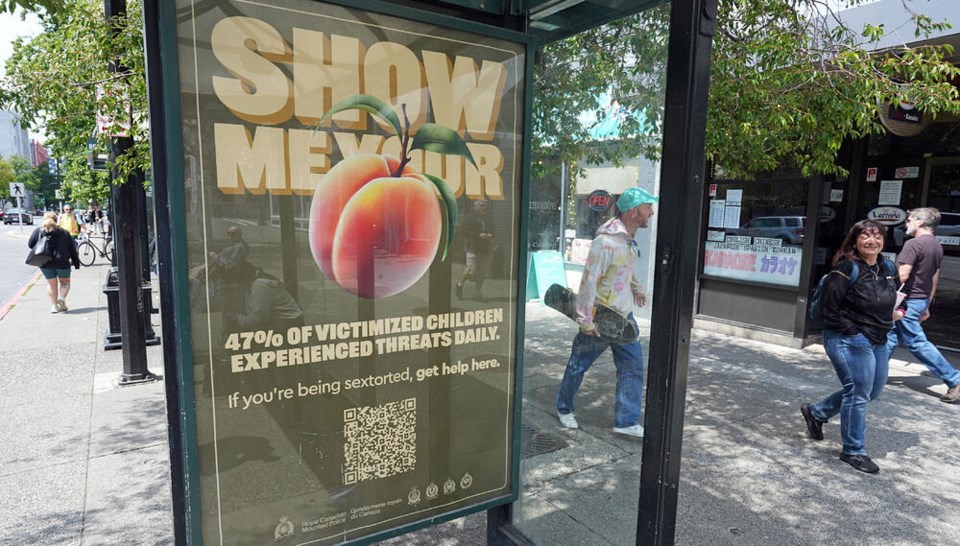A series of provocative ads aimed at raising awareness among teens of online “sextortion” is creating a buzz online, but experts say that’s exactly what it was designed to do.
The posters, which went up this month at bus shelters, feature the phrase “SHOW ME YOUR” followed by either a peach, eggplant, cat, taco or melon emoji — all used by teens to represent intimate body parts.
The ads are meant to raise awareness of sextortion, or sexual extortion, where young people are tricked into sending explicit images and threatened to have them shared publicly unless they hand over money or more nude content.
The campaign was created through a collaboration between Greater Victoria’s Integrated Child Exploitation Unit and the –°¿∂ ”∆µ RCMP’s Integrated Child Exploitation Unit, and funded by the Ministry of Public Safety and the Solicitor General.
Sextortion is , especially among boys as young as 12, who get scammed by criminals posing as teenage girls looking for a sexual relationship.
Some online reactions to the posters are positive — one Reddit user online called them a “wake up call for parents, right in your face,” while another said the poster was an “odd and weird ad to put at a public bus stop.”
Darren Laur, founder of the White Hatter, a company that educates youth and families about cybersecurity, said the advertisements have successfully captured the attention of the public, including young people.
“If you’re going to connect with teens, you’re going to need to do it in a way that reflects where they are today,” he said.
An ad with language tailored to adult audiences would likely go unnoticed by the youth affected by sextortion, Laur added. “To older people, it will shock and awe them, but we need to understand that it’s not their world.”
Const. Solana Paré with the –°¿∂ ”∆µ RCMP’s Integrated Child Exploitation Unit said the ads, which are running on Vancouver Island and in Greater Vancouver, were meant to turn heads.
While they might be shocking for some, so are the incidents of sextortion, she said.
The posters feature statistics that highlight the prevalence of sextortion crimes and the fact that the target demographic is very young — one poster notes that 47 per cent of victimized children experienced threats daily.
Central Saanich Police Sgt. Paul Brailey, who leads the Greater Victoria Integrated Child Exploitation Team, said the joint venture comes at a time when reports of sextortion have increased 150 per cent in the last six months across the country.
Brailey said sextorters are often experienced criminals who seek financial control over their victims.
“These are people sitting in basements trying to get as much money as they can out of these kids by extorting them,” he said.
Paré said the hope is that the campaign will increase awareness of how to prevent sextortion and guide those who have been affected to resources using the QR code included on every poster.
The code links to the RCMP’s , which explains how to prevent it from happening, and what to do if you’ve experienced the crime, including where to report it.
Paré also recommends that people visit or if they’ve fallen victim to sextortion.



